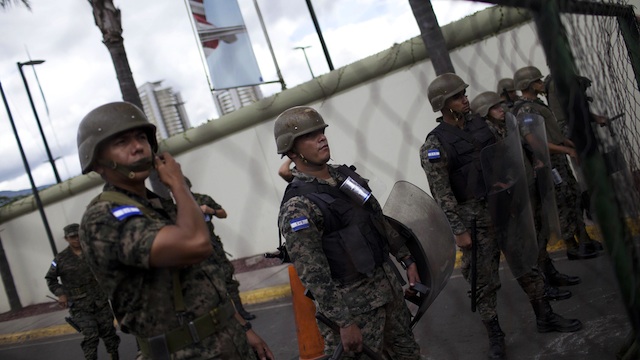SUMMARY
This is AI generated summarization, which may have errors. For context, always refer to the full article.

TEGUCIGALPA, Honduras – Political tension gripped Honduras on Monday, November 25, as the conservative candidate insisted he won the presidential vote, while the leftist opposition rejected the result and threatened to take to the streets.
The clash between Juan Orlando Hernandez, of the ruling right-wing National Party, and left-wing candidate Xiomara Castro brought new uncertainty to a country reeling from gang violence, poverty and the wounds of a 2009 coup.
With 62% of the vote counted, Hernandez led a field of eight candidates with 34.2% followed by Castro with 28.9%, according to the supreme electoral tribunal.
The electoral authorities have yet to announce a winner. But Hernandez and Castro both declared victory after polls closed late Sunday, November 24.
Castro’s husband, deposed former president Manuel Zelaya, told reporters that her camp “does not accept” the result after claiming that the election was stolen, with “serious inconsistencies” in one-in-five polling stations.
Hundreds of Castro supporters protested in front of the tribunal amid a heavy police and military deployment across the nation.
But Hernandez said the result was “not negotiable with anybody” and he named a transition team to succeed President Porfirio Lobo, urging Castro to join him in a “great national pact” against violence and poverty.
The governments of Colombia, Guatemala, Panama and Costa Rica congratulated Hernandez. Nicaragua’s leftist President Daniel Ortega also recognized Hernandez as the winner.
In Washington, US State Department spokeswoman Jen Psaki congratulated Honduras for a peaceful election and said international observers reported that the vote was “generally transparent.”
Psaki urged Hondurans to wait for the completion of the vote count and “to resolve election disputes peacefully through established legal processes.”
Lobo, who will hand over the presidency on January 27, called on Hondurans to avoid “confrontation” and congratulated Hernandez for his “very deserved electoral victory,” calling him the “president-elect.”
While Castro remained out of sight, her husband did the talking.
“We will defend our triumph,” Zelaya told reporters at a hotel in Tegucigalpa as hundreds of supporters chanted “We hear it, we feel it, Xiomara president!”
“We will go to the streets if necessary to defend our rights,” said Zelaya, a former conservative who was ousted by a right-wing alliance in a military-backed coup in 2009 after his politics veered to the left.
The conservative parties and military dictators have exchanged the presidency in the Central American nation since 1902.
Political conflict would add to the woes of a country plagued by the world’s highest murder rate, massive poverty and the divisions created by the coup.
Hernandez, the 45-year-old speaker of the legislature, said the people had spoken at the ballot box.
“The voice of the people is the voice of God,” he said, while recognizing that the election will bring two new parties to Congress, including Castro’s Libre movement.
Hondurans also voted for 128 congressional seats and 298 mayors.
The election’s winner will inherit a country of 8.5 million people with 71 percent of the population living in poverty and a soaring homicide rate of 20 murders per day.
Castro, 54, who ran to become the first female president of Honduras, wants to create a “community police” force to counter violence.
Hernandez favors an “iron fist” approach against the gangs, with 5,000 military police officers in the streets to confront the heavily-armed Mara 18 and Mara Salvatrucha. – Rappler.com
Add a comment
How does this make you feel?
There are no comments yet. Add your comment to start the conversation.